

Information Technology (IT) Pioneers
Retirees and former employees of Unisys, Lockheed Martin, and their heritage companies
Twin Cities, Chapter 31 .jpg)
1. Introduction
Shortly after Remington Rand bought out ERA in 1952, a new engineering, manufacturing,
and management building was built along the Mississippi across the river
from historic Ft. Snelling. As the new St. Paul corporate headquarters
it was labeled Plant 1, Sperry Park while the facility
on Minnehaha was re-labeled Plant 2. Business was growing
so a Plant 3 manufacturing facility was leased on
Prior Avenue three blocks south of Plant 2, the original ERA
facility (See the 1961 illustration at the right.)
The local commercial operations grew out of the Plant
1 facility so in 1961 the company began leasing buildings in the suburb
of Roseville - called Plant 4. Those were noted as
buildings 1, 2, and 3. The last of these buildings (#3) was
occupied by UNISYS until June 23, 2017 when they
merged operations in Eagan. Building 3 was the site of many of the
VIP Club meetings from 1986 through 2016.
In the late '50s even more engineering space was needed
so a large building just South of Plant 2 on Prior avenue was rented
to become Plant 5. Yet more space was needed in the
early '60s, a 1961 illustration at the right. A small building along side the Mississippi just North
of the Ford plant became a training facility and document storage building
- Plant 6. Another small building alongside Hwy 280
just north of East Hennepin Ave. was rented, Plant 7,
was close to Plant 4. The old Northwest Airlines office building on
University Avenue was leased and called Plant 8. There is some
controversy in that some VIP Club members recall that the Northwest
Airlines building was also called Plant 6 because the original Plant
6 was no longer being leased. Plants 2, 3, 5, and original plant 8 were within walking distance of each other.
Lunch breaks, dinner breaks for evening workers, and occasional project parties all took place at Eslinger's on University Avenue, half-way between plants 5 and 3. A few napkin designs over a cold brew often led to problem solutions thus "Slinger's" was occasionally called plant 9, albeit tongue-in-cheek.
In 1967 a new headquarters facility in Eagan opened,
named
Plant 8 because the University Ave. plant 8 site was closed.
In 1987, shortly after Burroughs bought Sperry to form UNISYS,
the corporation occupied 28 facilities in the Twin Cities area, as
listed
in the table below.
A 1986 Sperry newsletter has a brief description of the local buildings then - and pictures too. This was submitted to the Legacy by Paul Dickson.
In the 80's Unisys, Roseville had rented space in the Water's Edge building at the intersection of Hwy 36 and Snelling Avenue.
Note that the original ERA buildings are discussed in the Locations Chapter 30 [lab]
2. 1987 Twin Cities Facilities
All twenty eight of these buildings were occupied by UNISYS personnel in January, 1987 shortly after Burroughs had purchased Sperry to form UNiversal Information SYStems.
| Name | Street | MN City | ZIP | Notes |
| Building 1 | 2276 Highcrest Road | Roseville | 55113 | Plant 4 & Credit Union |
| Building 2 | 2391 Walnut Street | Roseville | 55113 | Plant 4 |
| Building 3 | 2470 Highcrest Road | Roseville | 55113 | Plant 4 |
| Building 4 | 1301 Industrial Blvd. | Minneapolis | 55413 | An old post office |
| Waters Edge | 1500 W. Co. Rd. B-2 | Roseville | 55113 | Mn/DOT since 1995 |
| Midway | 1902 Minnehaha Ave. W. | St. Paul | 55104 | Plant 2 |
| Shepard Road | 2751 Shepard Road | St. Paul | 55116 | Plant 1 |
| Sperry Park | 3333 Pilot Knob Road | Eagan | 55121 | Plant 8 - Lockheed Martin MS2 |
| Semiconductor Operations | 1500 Tower View Road | Eagan | 55121 | Defense Systems |
| Consolidated Facilities | 3199 Pilot Knob Road | Eagan | 55121 | MACS Building |
| Materials Management Ctr. | 1200 Trapp Road | Eagan | 55121 | ? |
| Eagandale Business Campus | 1301 Corporate Center Dr. | Eagan | 55121 | Defense Systems |
| Eagandale Business Campus | 1270 Eagan Industrial Rd | Eagan | 55121 | Defense Systems |
| Eagandale Business Campus | 1285 Corporate Center Dr. | Eagan | 55121 | Defense Systems |
| Eagandale Center | 1305 Corporate Center Dr | Eagan | 55121 | Defense Systems |
| Federal Information Systems | 2535 Pilot Knob Road | Mendota Heights | 55121 | was Burroughs |
| Reconditioning Center | 2465 So. Lexington | Mendota Heights | 55120 | was Burroughs |
| Education Center | 2001 Killebrew Drive | Bloomington | 55420 | was Burroughs |
| Metro | 3001 Metro Drive | Bloomington | 55420 | ? |
| Corporate Square C | 3110 Neil Armstrong Blvd. | Eagan | 55121 | Defense Systems |
| Corporate Square D | 3140 Neil Armstrong Blvd. | Eagan | 55121 | Defense Systems |
| Corporate Square E | 990 Apollo Road | Eagan | 55121 | Defense Systems |
| Yankee Square 4 | 3459 Washington Drive | Eagan | 55122 | Defense Systems |
| ARTS III Test | 6301 34th Ave. S | Minneapolis | 55450 | Defense Systems (at airport) |
| Regional CSE | 5215 Edina Industrial Blvd | Edina | 55435 | was Burroughs |
| CSE Parts | 5259 Edina Industrial Blvd | Edina | 55435 | was Burroughs |
| Branch Marketing | 251 Lafayette Road | St. Paul | 55107 | was Burroughs |
| Branch Marketing | 6130 Blue Circle Drive | Minnetonka | 55343 | was Burroughs |
This chart data was provided by Bernie Jansen
3. Facility Descriptions
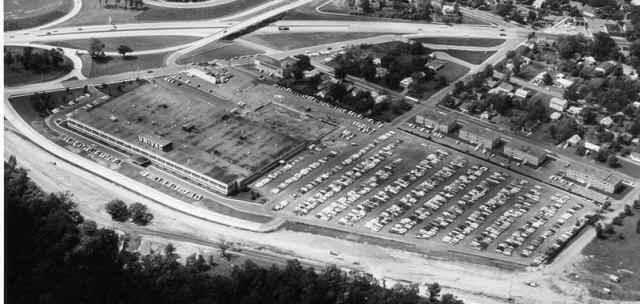 3.1 Plant 1
3.1 Plant 1
Plant 1 opened about September of 1956 according to Jim Hyslop who was hired in December 1956. The 'freeway' road at the top of the picture is West 7th Street. West 7th to the right leads to down town St. Paul. To the left crosses the Mississippi River to Ft. Snelling, Minneapolis, and the airport. The roadway along the front of the UNIVAC building ended at the parking lot. Near the top center along the frontage road was Gannon's restaurant, the site of the first 'First Friday' luncheon meetings.
The rectangle in the picture's center behind Plant 1 shows the footings for a 1965 plant expansion - to become a 35,000 sq. ft. area for manufacturing the Nike-Zeus computer's film memory. Later this facility housed the first automated back-panel wire-wrap machines brought on board for the CP-901, UYK-7, ..., manufacturing.
Today, this road is an expressway following the river (Shepard Road)
to downtown St. Paul. This second UNIVAC photo shows an addition
on the east side with a finished freeway like Shepard Road along the
Mississippi river. 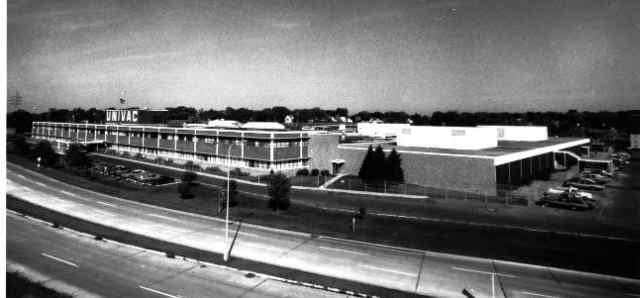
3.2 Plant 3,

Awaiting inputs for this section. In 1965, the Defense Systems Division1 announced the acquisition of 11,000 sq. ft of existing floor space at Plant 3. This plant was walking distance from Plant 5, Plant 2, and Esslinger's Restaurant.
3.3 Plant 4
In 1961 near the intersection of Highways 36 and 280, the company1 became the first 'Space Center' tenet as they leased 130.000 square feet of space [Building 1] from the owners, St. Paul Terminal Warehouse Co. The Univac Data Processing Division continued to grow, adding 23,700 sq. ft. in 1962 in Building 2, 25,000 in 1963, 24.300 sq. ft. in 1964, then an additional 182,640 square feet in 1965 as they opened building 3, the current Plant 4. {Editor's note: Building 3 was vacated on 23 June 2017 as Roseville operations were combined with the UNISYS Eagan operations. [lab]
During our LEGACY, the commercial operations transitioned to independence from the defense operations during the 60s. Through the late 50s to the late 60s, Plant 1 housed a military computer center and a commercial computer center with an 1107 across the hall from each other. During the 70s and 80s the two organizations held annual joint technology exchange forums at Craguns' Resort in Northern Minnesota.
 Another aspect of the LEGACY was the almost free transfer
of talented managers and engineers between defense and commercial as
projects started or waned. Glen Kregness, Bob Oulicky, and Tom Soller
are three that immediately come to mind. Brothers Tom Petschauer worked
at Plant 8 while Dick Petschauer worked at Plant 4 - both in engineering
management. [lab]
Another aspect of the LEGACY was the almost free transfer
of talented managers and engineers between defense and commercial as
projects started or waned. Glen Kregness, Bob Oulicky, and Tom Soller
are three that immediately come to mind. Brothers Tom Petschauer worked
at Plant 8 while Dick Petschauer worked at Plant 4 - both in engineering
management. [lab]
In 2009 Buildings 1 and 2 were razed to make space for re-development.
At the right is building 1 as photographed in June by Bruce Hyslop - UNISYS
employee and son of Jim Hyslop who is a UNIVAC retiree.

At the left is building 2 as photographed by UNISYS employee Gary Rist in
July 2009.
1. UNIVAC NEWS TWIN CITIES SECTION June-July, 1965
3.5 Plant 5
Plant 5 was located on Prior Avenue adjacent to the plant 2 facility. I, Lowell, was first in this plant in 1962 when the Automatic Antenna Coupler (ACC) design department and ACC manufacturing management departments were moved there from plant 1. I do not recall which other departments were in the building. The front of the building on Prior Avenue had two stories, the second had offices of engineering directors; George Raymond, Jay Kershaw, et al'. The ACC engineering dept. had an electronics laboratory in which development testing took place. The field service engineers (under Bob Brown) were in that lab and the ACC draftsmen played 'Washers' during lunch breaks. Chuck Donahue, Paul Dietzler, Oscar Hayman, et al'. Plant 5 was also a small technical writing department there, reporting to Don Anderson. I was in that group for ~6 weeks the spring of 1963 as an editor after the ACC departments were being transition to Sperry Marine in SC.
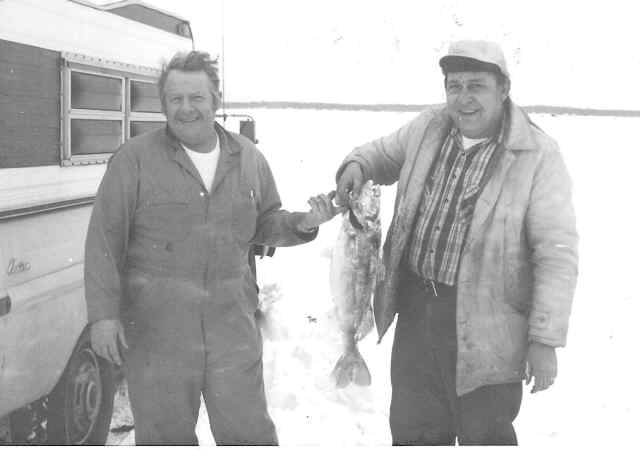 The back of the building had a mezzanine, in 1973 I had a
desk there as a supervisor of 1616 & UYK-15 continuation engineering
reporting to manager Bob Oulicky. Also there was the CP-890
support engineering group under the direction of supervisor, Ray
Dombeck. I recall that Bob Jablonski came into the group as we
did the 1616 design conversion into the 3760 communications
processor. The unique thing about the 3760 was that we
developed an 8-bit parallel daisy chain interface feature so that
the unit could operate with IBM hardware. Don Shore did most
of the mechanical design for that unit. This group had a 'once
a month' bridge evening with 8 people - I, Lowell, was an occasional
substitute with them. AND, most were avid fishermen -
Shown here are Al Keding and Bob Oulicky with a walleye from Lake
Mille Lacs suring a February ice fishing outing. [lab]
The back of the building had a mezzanine, in 1973 I had a
desk there as a supervisor of 1616 & UYK-15 continuation engineering
reporting to manager Bob Oulicky. Also there was the CP-890
support engineering group under the direction of supervisor, Ray
Dombeck. I recall that Bob Jablonski came into the group as we
did the 1616 design conversion into the 3760 communications
processor. The unique thing about the 3760 was that we
developed an 8-bit parallel daisy chain interface feature so that
the unit could operate with IBM hardware. Don Shore did most
of the mechanical design for that unit. This group had a 'once
a month' bridge evening with 8 people - I, Lowell, was an occasional
substitute with them. AND, most were avid fishermen -
Shown here are Al Keding and Bob Oulicky with a walleye from Lake
Mille Lacs suring a February ice fishing outing. [lab]
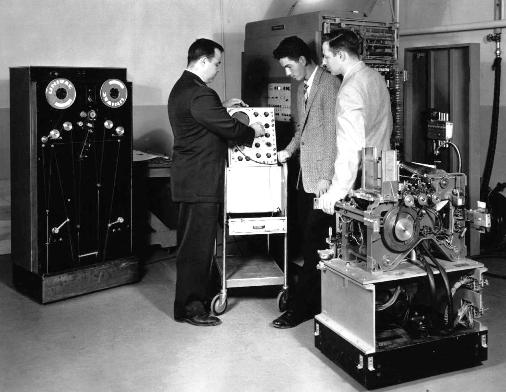 3.6 Plant 6.
3.6 Plant 6.
Chuck Homan told me [LABenson] that he'd worked in Plant 6 across from the Ford plant when UNIVAC first leased it. They called it the Micro-Tone building because that was the previous tenant. This building was the training site for a period of time, both programmers and field service engineers. The snapshot at the left shows a card punch, a magnetic tape unit, and a computer along with an instructor and two students using an oscilloscope. I think that Dan Newton is on the left and Hal Rogers on the right.
3.7 Plant 6, the second.
Many people are familiar with the old Northwest Airlines building located on University Avenue in St. Paul, just East of Prior Avenue. This was originally identified as plant 8 although a few knew it as the second Plant 6.
3.8 Plant 7.
This building was along the west side of Highway 280 between Hennepin
Avenue and Broadway. For awhile during the early '60s there was an old
airplane shell underneath some of the adjacent power line stanchions.
These has long since been razed and been replaced with a truck servicing
operation.
![]()
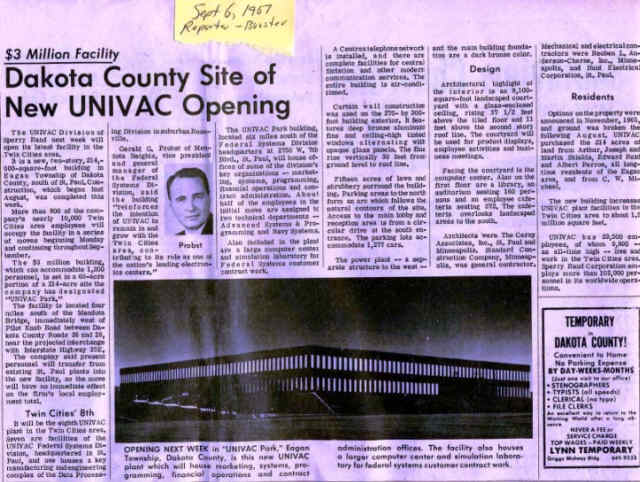 3.9 Plant 8.
3.9 Plant 8.
The Eagan home of Lockheed Martin MS2 was built in the 60s, [see the Sept. 6, 1967 news, right] expanded in the 70s and has been modernized a few times since then. Note the newspaper clipping proudly states that this is the "Twin Cities' 8th".
Shortly after opening, the Military Computer Test Center was moved into the basement from its former location behind the visitor's entrance of plant 1.
Below is a 2013 snapshot of the Eagan plant 8 facility razing before
the ground was bared for development of a shopping center.

3.10 MACS Building
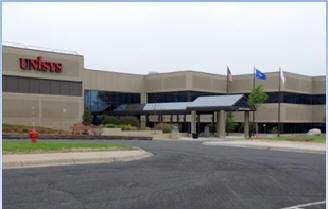 Shown here, just to the North of Plant 8 is the 'MACS' building,
a UNISYS commercial systems support building.
This building was erected in 1987 to
consolidate the various Burroughs facilities that had been in several
places around the cities. The north facing visitor's entrance is
the VIP Club's meeting entrance when scheduled with management. In 2017, the Roseville operations will be moving
into the building wing at the right of the flags.
Shown here, just to the North of Plant 8 is the 'MACS' building,
a UNISYS commercial systems support building.
This building was erected in 1987 to
consolidate the various Burroughs facilities that had been in several
places around the cities. The north facing visitor's entrance is
the VIP Club's meeting entrance when scheduled with management. In 2017, the Roseville operations will be moving
into the building wing at the right of the flags.
During 2025 the Unisys operations will be transitioning to Woodbury as Corporate Unisys sold this area in 2024 - the last site owned by the corporation. All other operational sites are at leased facilities. [lab]
3.11 Semiconductor Operations
The original semiconductor research and manufacturing facility was in the basement of the west wing of the plant 8 facility. They later expanded and constructed a separate new semiconductor facility at the NW corner of the Eagan property, circa 1968. The center of the building was separately isolated on air cushions to isolate it from ground vibrations which might have compromised the photolithography steps during semiconductor processing. [LDBolton]
Early products of this semi-conductor facility included MNOS memory chips for an Air Force project and custom VLSI devices for the UYK-43 and UYK-44 projects. It was also the site for research into radiation hardened CMOS technology under Dr. Wells. [lab]
In 2013 we posted Our Stories 182, July: Semiconductors at UNIVAC by Bernard 'Mike' Svendsen.
In 2019 we posted Our Stories
Nov:Micro-1100,
Carl Johnson has donated two displays to the Lawshe Memorial Museum
to exhibit the 1980's development of this VLSI chip set that became
the core of the UNISYS 2200 product line.![]()
45 1/2 years later (March 2013) the facility was razed to make way for new business developments. Most of the defense industry projects have been phased out or transferred to other facilities around the US since November 2011 when LMCO made their 'facility closing' announcement.
3.12 Others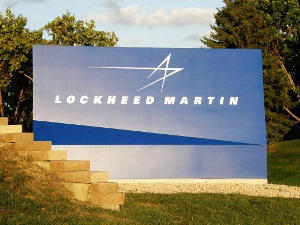
The Air Traffic Management (ATM) engineering group and a small 'think tank' group of engineers continued an LMCO presence in Minnesota in 2013 at a leased facility on Quarry Road, which intersects with Pilot Knob Road. A very small group of engineer/scientists reporting to the LMCO Advance Technology Department remains.
This ATM group was spun off into the Liedos corporation in 2016. [lab]